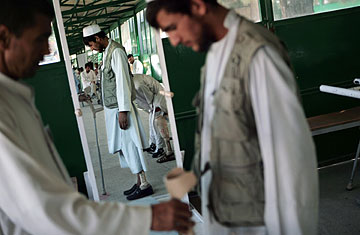
A staff member and patient in Kabul's International Committee of the Red Cross Orthopaedic center
Muneera Habib Mansoor was at a garden party in Kabul in 1997 when she stepped on a land mine. Her first leg was blown off, the second had to be amputated. Najmuddin Helal drove over a land mine in 1982 and lost both legs. Gulandam Karami, a widow with three children, stepped on one last year as she was taking her goats to pasture. She lost both legs at the hip, and is only just now learning to walk on prosthetics. She is progressing well, but worries that her new legs — shod in bright red Adidas — will not be able to handle the pathways in her mountain village, which is a three-hour drive from Kabul. Still, she says, any help at all is a boon. "Before this, I was crawling."
Ten years ago 122 nations signed the Ottawa Convention, a landmark agreement that banned the production, sale and use of land mines. The impact has been significant. The number of victims killed or maimed annually has fallen from 26,000 in 1996 to less than half that today. Afghanistan, which signed the treaty in 2002, has seen cases more than halved from 2000 in 2001 to 796 last year. Still, the stories of Helal, Mansoor and Karami reveal a reality that no treaty can erase. "Mines don't just cut off legs," says Mansoor, "they destroy the soul. If someone loses a limb, we can replace it. But we can't repair the soul."
As one of the most heavily mined countries in the world after Columbia, Afghanistan has made progress eliminating this menacing legacy of conflict. All known stockpiles of landmines have been destroyed, and nearly 60% of the country has been painstakingly cleared by de-mining experts. A $80 million funding boost from Canada, announced yesterday, will set Afghanistan well on its way towards being mine-free.
That's welcome news to groups such as the International Committee of the Red Cross (ICRC) which provides prosthetics and helps rehabilitate land mine victims and other disabled Afghans. Tens of thousands of mine victims will need health care and assistance for the rest of their lives, and there has been a chronic lack of resources to meet those needs. Opened in 1988 at the height of the war against the Soviet Union, the organization's Afghanistan orthopedic programs have treated more than 76,000. But they don't stop at giving people prosthetic limbs. The ICRC's Ali Abad Ortho Center in Kabul provides jobs, employing only the disabled. "We discriminate 100% here," says Alberto Cairo, an effusive Italian who heads the orthopedic program. "If you want a job here, cut off your leg." He pauses to pet the center's resident collie, which limps because it was hit by a car. "Actually, don't do that. We don't have enough jobs as it is." Cairo nods at a young man serving tea with a prosthetic right hook. He also wears a prosthetic left foot. "That's not a landmine injury," Cairo says. The appendages were cut off by the Taliban. "I don't care if he was a thief. Whatever happened, he has paid." Even members of the Taliban have come to the center for treatment. "If you have been wounded, if you are missing a limb, if you are paralyzed, we don't care who you are," says Cairo. "We will treat you."
The center's 250 employees make prosthetics, practice physiotherapy and teach new patients how to use their new arms and legs. "I know what they are going through," says 35-year-old Mansoor, who started work at the center soon after she received her prosthetic legs. Now she crafts braces for polio victims. "And they see me, working, so they know that they can go out and still do something with their lives."
The U.S. has been one of the world's major contributors to global humanitarian land mine assistance. Every year the U.S. sponsors land mine-recognition training in schools around the world. It pays for de-mining programs and equipment. What it hasn't done, however, is actually agree to the convention. Neither have the governments of China, Russia, India, Pakistan and other countries that reserve the right to produce, sell and utilize mines. "It's disgusting that these countries don't sign the convention," says Cairo. "It is an absolute injustice. It's a monster. It's like creating a virus and spreading it around the world." But for this virus, prevention is the only answer. There is no cure.
